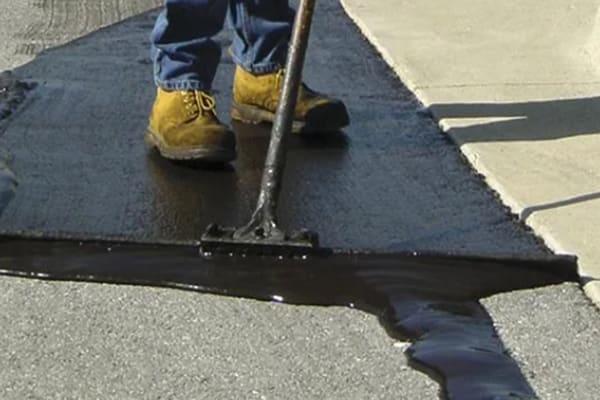When it comes to maintaining asphalt surfaces such as roads, parking lots, and driveways, the application of a sealer is essential to protect against environmental damage, wear, and tear. Coal tar asphalt sealers have long been one of the most popular choices for this purpose, particularly in areas that experience heavy traffic, harsh weather, or exposure to chemicals. But is coal tar truly a good asphalt sealer? To answer this question, it's important to explore the properties of coal tar, its advantages and disadvantages, and how it compares to other sealing options available today.
What is Coal Tar Asphalt?
Coal tar asphalt is a byproduct of the coking process, where coal is heated in the absence of air to produce coke, a material used in steel production. The residue left from this process is coal tar, a thick, black, sticky substance. When coal tar undergoes further distillation, it produces coal tar pitch, which is the key component in coal tar-based sealers.
Due to its unique composition, coal tar asphalt sealers offer several distinct advantages, especially in environments where the asphalt surface is exposed to fuel, oils, chemicals, or extreme weather conditions.
Advantages of Coal Tar Asphalt Sealer
1. Exceptional Durability and Protection
One of the main reasons why coal tar asphalt is widely used as a sealer is its durability. It forms a thick, protective layer on asphalt surfaces that is highly resistant to wear and tear from both vehicular and foot traffic. The sealer acts as a barrier, preventing water, oils, and chemicals from penetrating the surface and causing damage over time.
Coal tar asphalt also offers superior protection against oxidation, which occurs when the asphalt is exposed to UV rays. Without a protective sealer, the surface can become brittle and crack due to sun exposure. Coal tar asphalt slows down this process, prolonging the life of the asphalt and reducing the need for frequent repairs.
2. Chemical and Oil Resistance
A key benefit of coal tar asphalt sealer is its resistance to chemicals, particularly petroleum-based products such as gasoline, motor oils, and solvents. For this reason, it’s often used on parking lots, airport runways, and gas station surfaces, where vehicles frequently leak or spill these substances. Coal tar sealers act as a strong barrier against oil and fuel stains, preventing them from penetrating and weakening the asphalt structure.
This chemical resistance makes coal tar asphalt particularly valuable in industrial settings, where the surface may be exposed to harsh chemicals that would otherwise degrade traditional asphalt surfaces.
3. Waterproofing Capabilities
Coal tar asphalt sealers are also highly effective at repelling water. By creating an impermeable surface, the sealer prevents rain, snow, and ice from seeping into the asphalt. This is critical in colder climates where water penetration can lead to freeze-thaw cycles, which cause cracks and potholes. The waterproofing properties of coal tar asphalt reduce the risk of such damage, ensuring a longer-lasting surface.
Disadvantages of Coal Tar Asphalt Sealer
Despite its many benefits, coal tar asphalt sealer also has some drawbacks that have caused its use to decline in certain areas. These issues mainly relate to health, environmental concerns, and aesthetics.
1. Health and Environmental Risks
One of the most significant concerns surrounding coal tar asphalt is its content of polycyclic aromatic hydrocarbons (PAHs). PAHs are chemical compounds that are known to be harmful and potentially carcinogenic. During the application of coal tar asphalt sealers, these compounds can be released into the air, posing risks to both the workers applying the sealer and the environment.
Over time, PAHs from coal tar sealers can wash off into water systems through rain and runoff, leading to soil and water contamination. As a result, many regions have implemented restrictions or bans on the use of coal tar-based sealers, particularly in residential areas and near bodies of water. In response, more eco-friendly alternatives have been developed, but they do not always offer the same level of protection as coal tar.
2. Strong Odor and Long Curing Time
Another disadvantage of coal tar asphalt sealer is its strong odor during application. The fumes can be unpleasant and potentially harmful if inhaled over long periods. Moreover, coal tar sealers typically have a longer curing time compared to other sealants, meaning the surface may be unusable for longer, which can cause disruptions, especially in commercial settings.
3. Aesthetic Concerns
While coal tar asphalt provides excellent protection, it has been criticized for its shiny appearance once cured, which some people find less visually appealing compared to the matte finish of other sealers like asphalt emulsion. Over time, coal tar sealers can also fade, especially in areas with high UV exposure, leaving a less uniform appearance.
Alternatives to Coal Tar Asphalt Sealer
With growing environmental and health concerns, alternative sealants have gained popularity. Asphalt emulsion sealers, made from petroleum-based asphalt, are commonly used as an alternative. While these sealers may not offer the same level of chemical resistance as coal tar, they are eco-friendly and do not release PAHs.
Other alternatives include acrylic sealers and latex-based sealers, which also provide good protection without the environmental drawbacks of coal tar.
Conclusion
In conclusion, coal tar asphalt is a highly effective sealer for protecting asphalt surfaces, offering exceptional durability, chemical resistance, and waterproofing. However, its use has become more controversial due to health and environmental concerns, particularly related to the presence of PAHs. While it remains a good choice for heavy-duty applications, such as in industrial or high-traffic areas, many consumers and contractors are turning to more eco-friendly alternatives. As with any material, the choice of sealer should depend on the specific needs of the project and the potential environmental impact.
Post time: 09-19-2024






